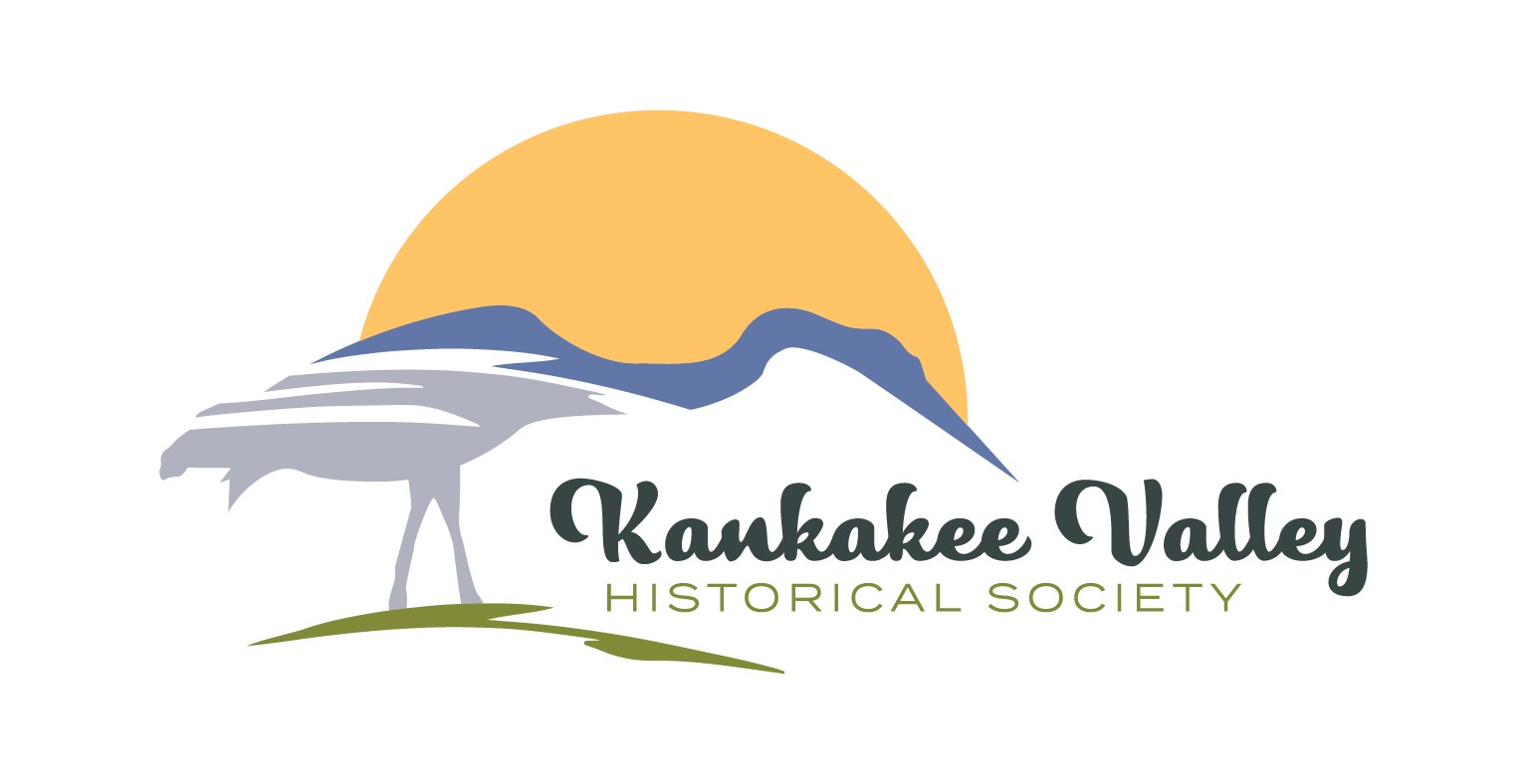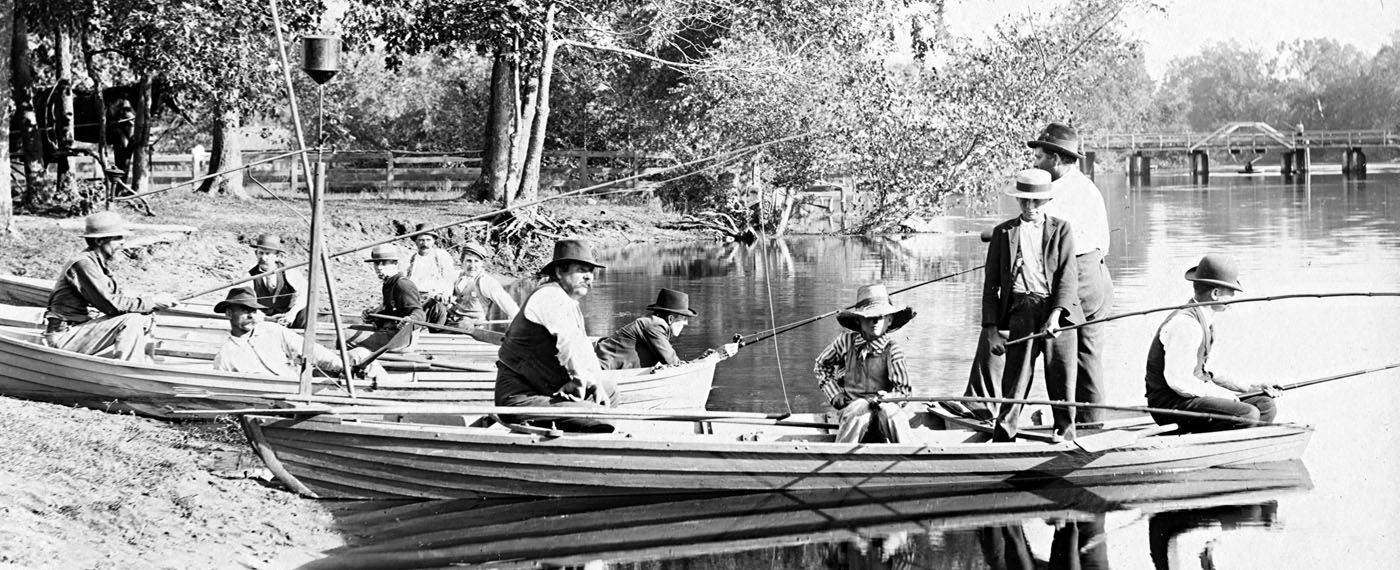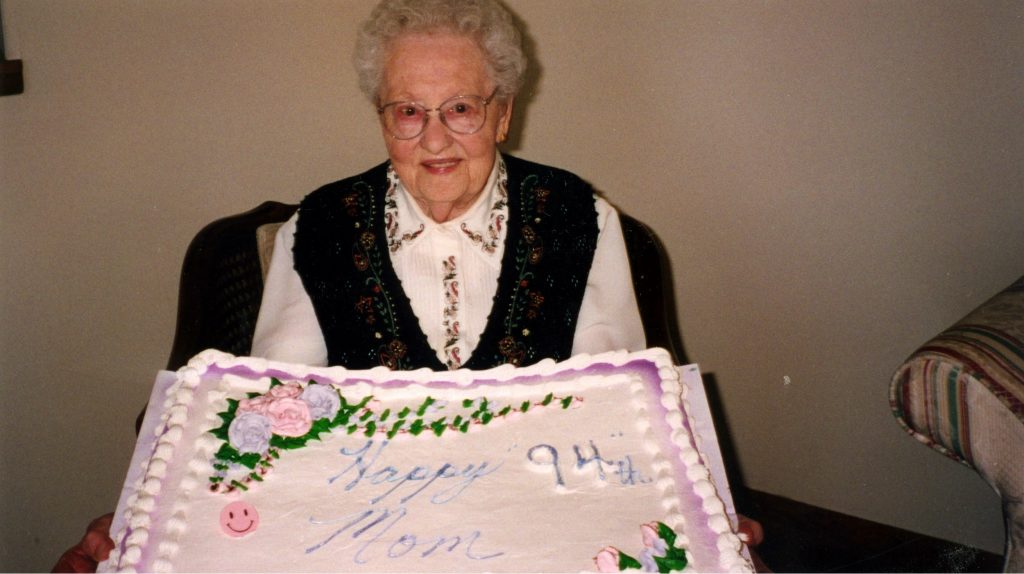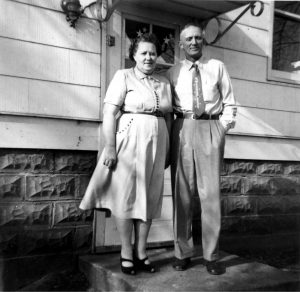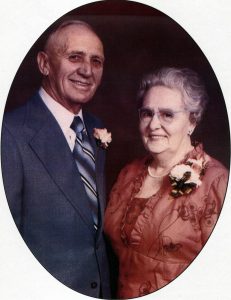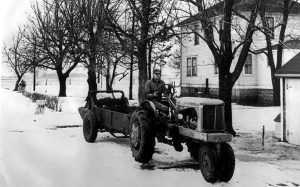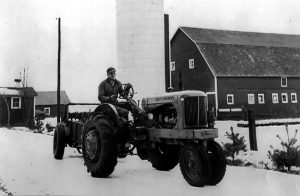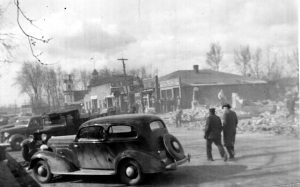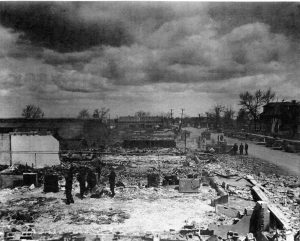Grace Dexter-Seegers
The Settling of the Grand Marsh of the Kankakee River
Interview by Laverne Terpstra, transcribed by Shirley Zeck
November 11, 1992
Sponsored by
DeMotte-Kankakee Valley Rotary Club
Oral History Project
I was born in Goodland, Indiana on April 10, 1907. The reason that we came to this area was that my father had died. He had stomach cancer and he died in the Presbyterian Hospital in Chicago. I remember during that time there were people from the Presbyterian Church where we went that I stayed with. Sarah and George stayed with other families while my mother was gone to Chicago with my father. He didn’t live too long after the surgery. I remember that they brought his body back to the house and we had the funeral in the house.
So, she had to make a living someway. She did housework for people in Goodland and they had a poultry house. She candled eggs there. Of course, we always got cracked eggs so we had plenty of eggs.
Then there were men who lived in DeMotte, Case Sekema. He was the brother to my mother’s first husband. He knew about Gabriel Musch. He had a family and his wife died in the flu epidemic. I don’t know whether it was a little baby or an unborn baby. And so, they had seven children. He needed a housekeeper, so he got my mother to come and keep house for him. I don’t remember just how long it was but then they finally got married. So there were twelve of us around the table with our three. It was really a big group.
I remember when I was going to school I had to stay home every Monday and help wash, because that was an all day job. I loved to go to school, and I think I was the only one in my family that graduated from high
school, but I loved school. I love to memorize. I remember in high school in our literature class we had to memorize a stanza of Whittier’s Snowbound and I memorized the whole thing. I just loved that.
When going to school Hank Boezeman had a bus pulled by horses and he picked us up. He would put his horses in the barn that was around there where there used to be a music room across from where Odle’s live there right in the school yard (right in the back part of the school yard). He would unharness his horses and feed them and then when school was out he’d go back and hitch up his horses and pick us up at the school. In the winter time when it was cold why he would have some kind of stove in there and I don’t know what it burned, whether it was coal or wood or what. But it kept us kind of warm.
Talking about hardships, I knew there was a car but my Dad didn’t take us anyplace. If we wanted to go we walked, especially if there was something doing at night. We never thought anything about walking, you know like to church on Sunday night or whatever. We never thought about that. As far as jobs, really the only jobs for girls were with housework, and you would go. I remember, I worked one summer at Evergreen Park for a lady who was going to have a baby and she had several children. So I worked there that summer and then I worked for Carl Fritt’s mother in the summer time doing housework. She had a hired man and four boys and they had meals – breakfast was just as big a meal, potatoes, cereal and meat and everything. Three big meals a day like that.
The only summer, well later on after I was out of school, I worked in Crown Point for Bill Carroll. He used to have the Chevy Dealership. I don’t remember how long I worked there. My sister worked in Crown Point too, for a lawyer. They had triplet girls and they had to iron all their clothes. Oh, she was so finicky. I worked there until just before I got married.
Back to working for the Fritts’. We used to have three big meals a day but for breakfast we always had to work the night before. We would have what they call Mupples. They were real small new potatoes. And we would boil them with the jackets on and then in the morning we would peal them and slice them and fry them for breakfast. Another thing they used to have was cornmeal. I don’t remember what they called it – scrable or something like that. We would boil the cornmeal, I think it was with water or milk, and pour it in bread pans. Then the next morning we would slice it, take it out of the pans, because it was solid, then fry it. They would eat it with syrup on it.
She did a lot of baking. She had a prune cake that was delicious. I never had any since then. Of course, I wasn’t interested in recipes so I didn’t even try to think of asking for recipes or anything.
I used to help when I was at home with the milking. I remember in the summer time why the cows were always out in the pasture by a hill just east of where we lived. We lived where you used to live (10990 S. SR 10). I used to ride a pony down there. That was on the hill where Barney Van Keppel lives (8571 W 1100 N). My pony was kind of tricky sometimes. We’d be going down and he’d put his head down and I’d fall off. I finally got the cattle home. It was early in the morning. I guess I’d like to get up early. Then I would help get the milking done.
In the summer time, it was weeding onions by crawling on your knees. They didn’t have any insecticides or any herbicides to kill the weeds.
In the fall, after school, you’d come home and help pick pickles until the patch was done. They used to have a pickle factory in DeMotte right where Bauman’s feed mill used to be (8th & Carnation St.). I don’t know whether there is anything there anymore or not. That was where the pickle factory used to be. You would take a load of pickles down there and you could sit there and wait while the inspector inspected them and sorted them out. A lot of times you would get kind of upset because you figured you had some nice pickles and they would put them in a category that was cheaper. The bigger they were the cheaper they were. And the small gherkins were the most expensive ones. You got the most for them.
Talking about school, we didn’t have a gym at the school, so all our extra-curricular activities were held in what is now Fagen’s Health Center (915 S. Halleck St.). We had out plays there. I remember I was in a couple of plays. I really liked that, because I could memorize. I didn’t have any problem memorizing my parts.
When I graduated in 1924 there were eight in our class. I think there are two of us left, Jenny Woudema and me. Leroy Stroup, Erdie Curtin, Elbert Cheever, Clare DeVries, Jenny Woudema, Cecil Hammerton. That was our class. We had our graduation ceremonies there.
I do remember they used to have independent basketball games. I remember some of the players. They were very good. I don’t think they ever had a school team. They called themselves the Independents. They would play other guys. I don’t remember where they were from. Bud Bol and Ralph DeKock were really good players. I remember those two. We used to go watch them once in a while. You didn’t have to pay to get in, you were just doing it for the fun of it, to have someplace to go.
I was on a team that practiced at school, but I tell you the school ground was full of sandburrs. It wasn’t any fun trying to play. We had to play out there. They had some hoops up there. We did play, maybe it was my last year in school, but we just played, I think for what they call gym now.
I remember we had outside toilets, four holes to a toilet. I never did go to a country school. I knew some of the people when we came when I lived in Goodland, I went to a school in town. Some of them went to McKinley School and some of those schools. But when I got here they had the school in DeMotte. I think I was a seventh grader. I never got to go to any of the country schools.
We had a pump outside and it was the stinky sulfur water. It was terrible. If you were thirsty enough you got used to it and drank it. I remember they had Home Economics. There was a Grace Karch from Wheatfield, I think who taught Home Ec. I remember I made myself a blouse. We had some cooking classes. I remember making Welsh Rabbit. I had never heard of it before, but I remember that.
One of my teachers was George Hammerton for book-keeping and typing. Margaret Marshall was the principal. That must have been about the last year I went to school. We had a principal by the name of Slayball. He was from Goshen. I remember Bert Llewellyn, I think he taught forever. I can’t remember some of the other teachers. I remember we always had art and I hated it because I couldn’t draw a straight line. We had English and literature. I remember I took algebra first freshman and Latin. I know algebra, and the next year I started on geometry and I thought I had better not. In latin I had first year latin and the next year was Caesar. What did they call that? I remember all Gall was divided into three parts and I couldn’t get that.
Talking about washing for a big family, we didn’t have the washing like we do now days. In those days we wore the same outfit all week to school. We had a Sunday dress, and we had two outfits for school. One for one week and then the other one was in the wash, so we wore that.
We used to get syrup in half gallon buckets. And those syrup buckets were our lunch pails. We used to have homemade bread and jelly. That was what we had for our lunch. We were so happy in the winter time when they butchered. We would have headcheese so we could have a sandwich made with headcheese. That was really a treat.
We used to fill the silo. Then we would have about ten men to cook for dinner and we had to give them meat and potatoes and vegetables and fruit dish or pie or whatever. I remember there was one little man, he wasn’t very big, but all he ate was potatoes, two helpings of mashed potatoes. I just wondered where he put it. I think that he was George Knip’s father. He used to help at our place for silo filling.
In the summer time of course, we canned vegetables and fruits and we really didn’t can meat because at that time they hadn’t gotten that far. They smoked the meat and they put the salt-pork down in the brine. Then wash it off when you got ready to eat it. That was just like eating saltpork bacon without being cured. That was our meat. We didn’t have beef, we had pork. My mother didn’t do a lot of sewing. But with three of four boys, that was in the days when the boys wore knickers, she made tops. They had a band and were gathered. They were more like a blouse that they used to wear. We made those for the boys to wear to school. I helped her and she told me how and I did a lot of the sewing for her. I did make a few dresses or skirts for school, but we didn’t do too much of that.
We had a game that we called Croconol. It was on a square board with pockets on each corner and you had kind of doughnut- shaped, wooden rings that you had to shoot across the board and try to get them in the pockets with your finger. You sure would get sore fingers by the time the game was over.
And I remember outside they used to play in the winter time fox and goose. When there was a whole bunch of kids they used to play drop the handkerchief and pump-pump-pullaway. I don’t even remember how to play that game anymore. Then they would go outside to play. Crack-the-whip, that was another one, but that’s about all I remember.
We didn’t have too many card games at home when I was home, because it was later we had Rook and Pit and all those games, but not really at home. I did mostly, if I didn’t know what to do with myself, I had a book and I could read. My mother used to get so mad at me. When it was time for setting the table for supper and she would call me and tell me. You know, I would never hear her. I was so engrossed in my story that I didn’t hear her and she thought I did it on purpose.
We didn’t do much celebrating at Christmas. Each one got a gift, but we didn’t have a big dinner or anything. Mostly it was the Christmas program at church. That was a big thing then. I didn’t think I had much leisure time, but when I did I had a book. I don’t remember where I got books. My mother didn’t have much time for anything else after washing and ironing and keeping up the house and cooking meals.
We ordered out of the catalog. I remember once I needed a pair of shoes and my dad went and got me a pair, he had the right size and everything. They had to be, I don’t remember whether there were buttons. They were high, you know, above the ankles. I still have a buttonhook. We never went shopping anyplace, everything was ordered. There was no place to go, so it was mostly from the Sears catalog, I think that was where most of our clothes were ordered.
My dad raised vegetables to take to the market, so we had plenty of vegetables to can. It was tomatoes, potatoes, cabbage. I can remember the onions because I had to weed them. We had pickles. We used to make like pickle relish, chow- chow they called it and things like that. That was just something fancy you know, it wasn’t regular vegetables. We canned in quarts and two quart jars. We didn’t need pints. I think maybe we used pints for relish. We put on zinc lids that would bend. I remember we’d spend so much time trying to get the jars sealed. Oh, that was a pain.
We didn’t have a root cellar or smoke house, but we smoked meat. We had smoked hams. Maybe they did have a place where they smoked them and I can’t remember. I thought my dad smoked them himself. Maybe there was a small place in the barn that they used.
I know there were high winds and our school yard being all sand, it would be pretty dusty, but I don’t remember the dust storms.
We were married in Crown Point. I was working in Crown Point at the minister’s parsonage. It was on the first of February and the road was full of ice. You had those chains on your wheels and it started raining and the ice started melting off the roads. We had to take the chains off. Then we went to Lafayette. I had a half-brother that lived in Brookston. We spent a few days there. We didn’t have much of a honeymoon, no money, so that was it. I wore a streetdress. There were no guests. We were just married in the parsonage.
We lived out on the ranch between DeMotte and Fair Oaks. You remember where Andrew Sipkema used to live? (650 S. County Line Rd.) There were two houses there. Martin Musch had one and we had the one out in the pasture. We lived there. Oh, that was some house, it was setting up on blocks and in the winter time the linoleum would blow up off the floor. If I mopped the floor it was all ice and we had emptied the tea kettles in the winter otherwise they would freeze.
We just burned wood. We had a kitchen stove that had wood and our stove in the living room was wood. Some of the wood they burned was green and it would just sizzle and go out. So Pete would start the fires before he went to the barn to milk so he could warm up. So then by the time I got up it was a little bit warm so I could get breakfast ready. The curtains would blow away from the windows. It was really something. One year they put all straw around the bottom so that it wouldn’t blow up under the floors. It was loose straw. In those days too, when we got married and had to clean the house, there were bed bugs. So we had to have formaldehyde candles in it for I don’t know how many days. The woodwork was dirty, I don’t know who lived there before we did, but it needed a lot of scrubbing.
We didn’t have much furniture. We had a kitchen table. We bought a second hand cook stove and we had some chairs. In the living room we had chairs but no sofa or anything. A bed and a dresser, and that was about the extent of it. We had a rug on the floor in the living room, some linoleum we put on the floor. I think we ordered all that stuff. Rensselaer was so far away that you didn’t go down there and how would you haul it home. There was no delivery in those days. I’m sure that we bought it from the catalog. We had to go the depot (RR) and get it. We would haul it in a wagon and hoped it was what you wanted. The pictures didn’t always show it like it really was. You just had to be satisfied with what you got. You just kept it.
They shivareed us. A bunch of your friends came. It was something like, well just a friendly get together, if the guys thought that they didn’t have to tear up things. I remember at our shivaree some of the guys got up on the roof and put a sack in the chimney to make the stove smoke. But they weren’t too bad.
I know we had cake and chocolate milk or something like that. It seemed like most of them had chocolate milk when they had shivarees. Sometimes they could get pretty rough, but the bunch that shivareed us, they were pretty good. I remember when Ben and Ede Hoffman got married it got pretty rough, I guess. They used to have shivarees after a couple was married for a week or so.
At one place they let the girls in the house and the boys had to stay outside. So there was a couple of them got together. One of the girls went to her house and got dresses and one of the guys dressed up like a girl. So they came back and the two guys that were standing at the door to see that no guys got in, why they let him in. He was dressed like a girl. So finally the girls in the house were having so much fun and laughing that these guys that were guarding the door went in. They saw that this one guy had dressed like a girl so they took him by an arm and threw him out of the house.
We didn’t have showers or anything when we got married. The family and close friends would give gifts. I remember in the depression when George and Minnie got married George worked for a dollar a day by Fritts. We didn’t have much either. So when they got married we gave them a goat for a wedding gift and they raised it. I think they sold it then.
We would go to the store once a week, Saturday nights usually. We had a flock of chickens and we would take eggs and we would trade for groceries. I guess that is bartering. Sometimes we had a little money coming back and sometimes we had to add a little with it. Usually we got a little money back. We had a whole case of eggs, maybe sometimes two, according to how many chickens we had.
During the depression, too, we had a crop failure. During the chinch bug times, we didn’t have any corn. It started in the wheat already. I think we had twenty-five bushels of wheat. We had some soybeans, but in those days you didn’t combine soybeans, that was for hay. So that was in the days that we had malt that we fed to the cows.
We had about ten cows we milked and sold cream and we had malt that they hauled out from the city or the brewery, I don’t know. We had stale bread that we fed to the hogs. And our chickens never layed so good that year. We had enough money to buy brewery malt for the cows and feed for the chickens.
We didn’t have to go into debt. That was a terrible year because we had nothing. The chinch bugs were real tiny little things almost like lice. My half brother from Brookston came out. He was showing us because they had talked about it, some of the wheat was getting yellow. So he went to my dad’s place and he went down in the field and showed us what it was. They said we don’t have to worry about a little bug like that. It wasn’t long that the government, the Agricultural Department, recommended we use tar. We would dig holes and put tar in it to stop them. They finally did that because they found out those bugs were bad. It would be like they dug the post holes and put the tar and those post holes would fill up in no time with those tiny little bugs. They were on the move all the time and they fall in the trap.
In the evening, we lived west of DeMotte, when the sun was setting and you looked to the west, it was just like the ground was moving with all those young red little mites. It was so thick, like the ground was moving. Soy beans was something they didn’t touch. It was the corn and wheat they killed. They sucked the sap out of it. I think this was before they had so many Army bugs. There was a drought, that was why those bugs got to be so numerous. The government furnished the tar, because Pete used to go to Rensselaer to get all the tar they wanted. It was all mixed, it was like pine tar is what it was, or coal tar. I don’t really remember whether it was in big five gallon buckets, oh I can’t remember how it was. There were some farm trucks and I think Pete distributed it. Some of them said they would never do it, but when they saw how they were working, it didn’t take them long. That was an awful year.
There were beef cattle and hogs. I know most farmers even if they weren’t, you know very big, had a few hogs, a few chickens, and you had milk cows. So if one wasn’t good you always had something. But now they just go into one thing so much now, so if it isn’t any good then they really are sunk. It’s an all together different way of farming now than what it used to.
We used to go out to the crib and get the nicest ears and shell them for our seed for another year. Now you pay $50-$60 a bushel for seed corn. That’s why you have to have more money too, because when we were farming it was $10 a bushel.
I remember the county agent in Rensselaer was from Purdue, that’s when soybeans first started. Before that there weren’t any soybeans. That was probably 1928 or 1929 or 1930. Because otherwise it was wheat and corn and oats. They had binders and the shocked oats, the wheat too. So we used to have threshing gangs too, besides silo filling gangs.
In 1936 I had taken Pete’s mother to Rensselaer. She had wanted to do some shopping. It was windy and hot. Then when we were in Rensselaer, I guess she was done shopping and we heard that DeMotte was on fire. So we came right back home. Of course, we couldn’t get near the town, but it was burned down.
I can’t think of anything else. I think I had all this written down. I wanted to remember that.
This concludes the interview with Grace Seegers.
